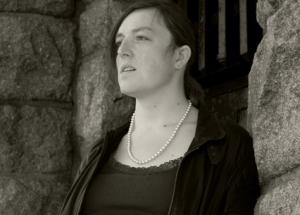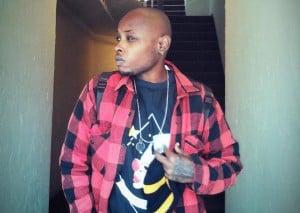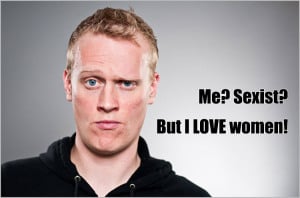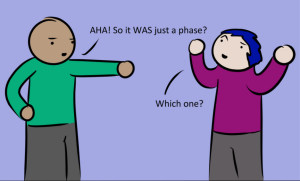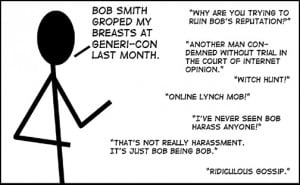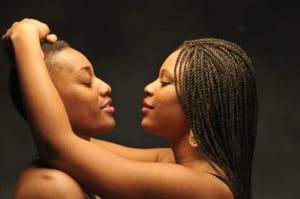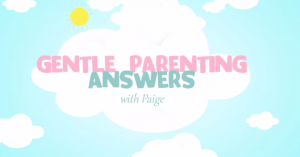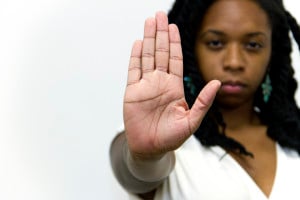VOICE: A feminist is anyone who wants equality because they, or a different group of people, are being subjugated because of who they are.
BRUKE: My name is Bruke Abraha, I’m a senior at LREI, and I am a feminist.
RUSSELL: I’m Russell. I’m 18. I’m in 12th grade.
MAX: I’m Max Fried. I’m 12th grade. I’m 18.
NOEL: My name is Noel Diggs. I’m a senior in high school.
CESAR: My name is Cesar Siguencia. I’m in 12th grade.
NATHANIEL: I’m Nathaniel Magloire. I’m in 12th grade.
LUIS: My name is Luis Rojas. I’m 16.
EMMETT: My name’s Emmett Dienstag, I’m 17 years old, I’m in 12th grade, and I’m a feminist.
NATHANIEL: And I’m a feminist.
NOEL: And I am a feminist.
MAX: I’m a feminist.
RUSSELL: I’m a feminist.
VOICE: What were your reasons for taking a feminism class?
CESAR: The class kind of appealed to me, the curriculum. And the reason I joined was because I kind of wanted to know what feminism meant.
BRUKE: My reason for taking the feminism course is that, especially in high school, there’s not opportunities like this that come around, ever.
LUIS: My sister attends Lehman College, and over there she was taking a feminism course, a women studies course, and she just seemed to really enjoy it. It was very new. I had never heard of women’s studies prior to LREI.
VOICE: What was your definition of feminism before taking the class?
NOEL: I didn’t have a concrete definition of feminism before the class. I knew it wasn’t really the perceived idea of the majority, which is like feminism is all women and a total hatred toward men.
EMMETT: My definition of feminism was any woman who wanted equality between the sexes.
NOEL: One of the biggest concepts we’ve learned in the class was this idea of intersectionality. Intersectionality is the idea that feminism goes beyond just equality for women; it’s equality between races, gender, class, sexual orientation, and so forth.
NATHANIEL: At one point, we wrote intersectionality essays. That taught me that nothing is really one directional. You can’t just be black; you can be black and gay, or black, gay and disabled. There are many different things that don’t relate to the master narrative set in place by America. So that I would take that as the most important thing that I learned was that nothing is just one dimensional.
EMMETT: We’ve been doing a lot. I know we just moved into sex trafficking, amongst girls and amongst really any age of children. And then before that we were doing things like harassment and acid attacks, which was pretty brutal.
LUIS: What impact did the class have on me?
CESAR: Feminism opened my eyes to just so much in the world. There were a lot of things that I just didn’t know about until I came to feminism, and it really just shocked me.
VOICE: How do you see the world differently now?
RUSSELL: Every time you read a magazine, every time you listen to a song, you can hear the misogynistic undertones.
MAX: I’ve now changed, I’ve been able to change my silence into action. If I see someone, something I don’t like, I’m not afraid to speak up, you know, and I’ll address that.
NOEL: So, a little bit after the class, me and Ileana teamed up again. We spoke at a conference for AUW against the sexual harassment of students at school.
BRUKE: I would encourage a friend or peer in joining the feminist movement because, once again, it really does embody more than just equal rights for women or it embodies more than just benefiting only women. It can help us all, too.
LUIS: I really try to tell them that it is a life-changing course. It’ll test who you are as a person. It’ll really impact you.
RUSSELL: My definition would now be equality for all genders, but also for other oppressed groups.
NATHANIEL: My definition of feminism is anyone that believes in equality from the start, whether it be gender, race, sexuality. That is what a feminist is. A feminist is not one dimensional.
VOICE: What do you see as the future of feminism?
NATHANIEL: Us! We’re the future of feminism right now. That’s why we have to keep the ball rolling. I was asked a while ago if as feminists, are we good where we stand? And a lot of people said yes and I say no. There’s still more work to be done.





